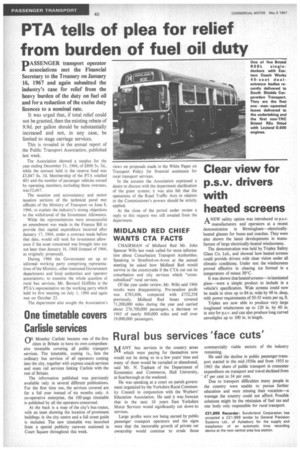PTA tells of plea for relief from burden of fuel oil duty
Page 42

If you've noticed an error in this article please click here to report it so we can fix it.
DASSENGER transport operator associations met the Financial Secretary to the Treasury on January 16, 1967 and again submitted the industry's case for relief from the heavy burden of the duty on fuel oil and for a reduction of the excise duty licences to a nominal rate.
It was urged that, if total relief could not be granted, then the existing rebate of 9.9d. per gallon should be substantially increased and not, in any case, be limited to stage carriage services.
This is revealed in the annual report of the Public Transport Association, published last week.
The Association showed a surplus for the year ending December 31, 1966, of £800 5s. 5d., while the amount held in the reserve fund was £3,847 Os. 3d. Membership of the PTA totalled 401 and the number of passenger vehicles owned by operating members, excluding those overseas. was 52,467.
The taxation and accountancy and motor taxation sections of the technical panel met officials of the Ministry of Transport on June 8. 1966, to explain the industry's strong objections to the withdrawal of the Investment Allowance.
While the representations were unsuccessful an amendment was made in the Finance Bill to provide that capital expenditure incurred after January 17, 1966, under a contract made before that date, would still rank for investment allowance if the asset concerned was brought into use not later than January 16, 1968 (instead of 1966, as originally proposed).
During 1966 the Government set up an informal working party comprising representatives of the Ministry, other interested Government departments and local authorities and operator associations, to examine the whole question of rural bus services. Mr. Bernard Griffiths is the PTA's representative on the working party which held its first meeting on July 1, 1966 and again met on October 25.
The department also sought the Association's views on proposals made in the White Paper on Transport Policy for financial assistance for rural transport services.
In the autumn the Association expressed a desire to discuss with the department clarification of the grant system; it was also felt that the operations of the Road Traffic Acts in relation to the Commissioner's powers should be strictly applied.
At the close of the period under review a reply to this request was still awaited from the department.




















































































































